As the small family-run shops in old Nicosia gradually give in, one has merely moved. 80 years of history now continue in a nearby village
This is the story of a happy surprise. The hero of our story is Faros, a bakery and confectionery that’s long been part of the landscape in old Nicosia – the kind of place municipal authorities look down on for being scruffy and decrepit, though also the kind of hidden gem tourists love discovering.
Here, for instance, is its one and only review on Tripadvisor (under ‘Pharos’), written by what seems to be a German couple in January 2019:
“This small bakery shop is hard to find and the sign is only in Greek so you need to look for it. They are only open in the morning barely up to noon. They offer a small selection of sesame bases [sic] pastries and cookies.
“Their tahinopita is among the best pastries we’ve ever tried. It’s of the flaky kind and the balance between bitterness, sweetness and cinnamon is wonderful. The shop owner took us straight to the very small production room behind the counter and we could watch them make the tahinopita. Very friendly and amazing couple, probably both above seventy, putting all ‘artisan-hippester [sic] bakers’ to shame with their experience. Very affordable. Worth a trip to Nikosia.”
The amazing couple in question are Chrystalla Evripidou and her husband Andreas – and their syrupy flaky tahinopita, more cake than pie, is indeed a highlight at Faros, albeit too rich to consume very often.
To be honest, I hadn’t been there much in recent years, though I probably passed by the two-storey listed building, with its rather grand bright-turquoise door, a few times a month. It was only recently, however, that it suddenly dawned on me that the door always seemed to be shut – and, on closer inspection, that there was a note tacked to the ornamental grating.
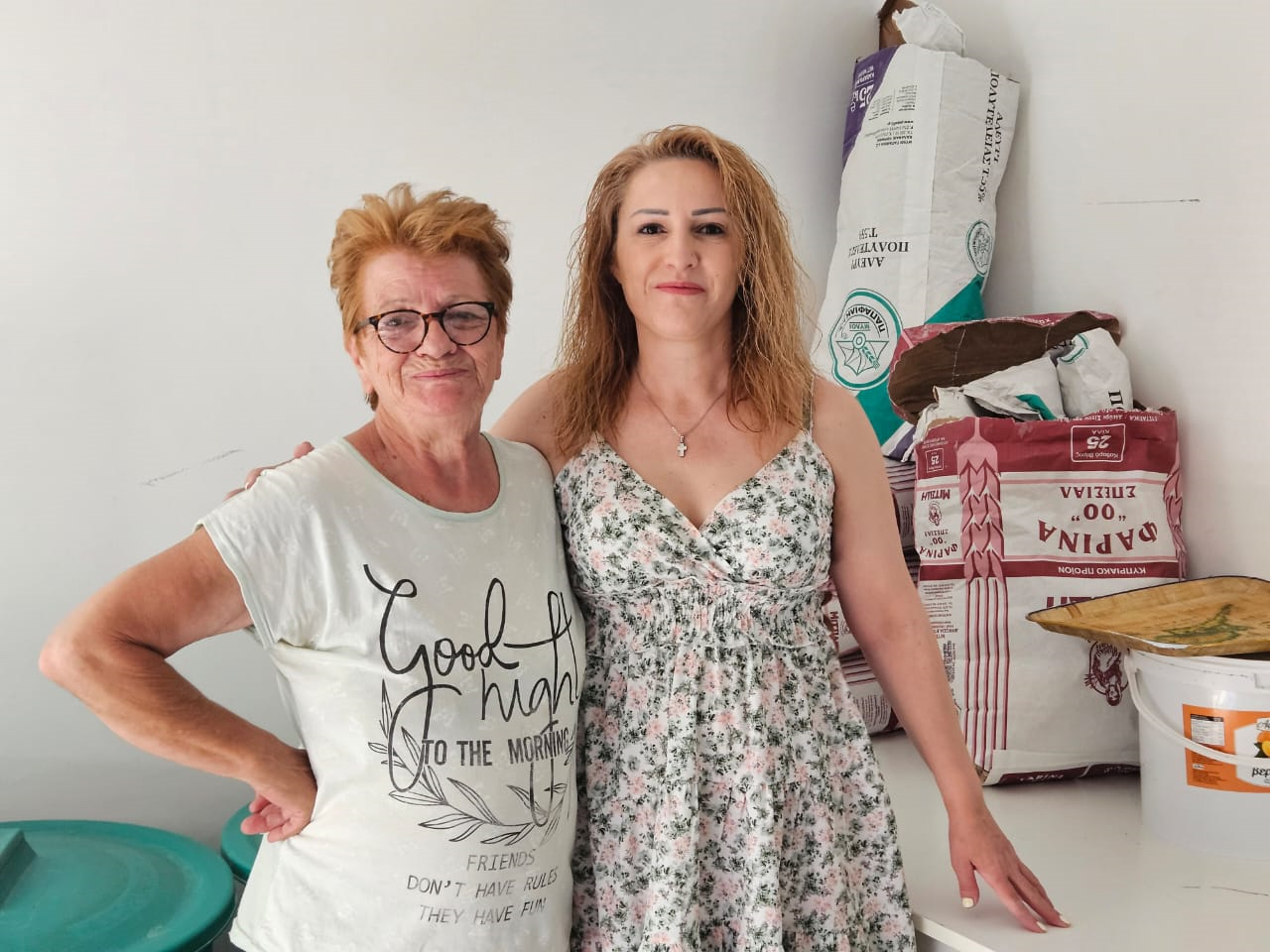
I instantly knew what that meant. We all do, those of us who love roaming around in the old city and have watched it gradually decline, then disintegrate: the walls crumbling, familiar faces disappearing, ‘Dangerous Building’ signs going up – and the doors closing as businesses shut down, one after the other.
The note, I knew, would read something like ‘Thank you for your custom, we regret having to close…’ etc. As I approached, however, I read something else, in fading orange marker: ‘CLOSED. The confectionery Faros is in the village of Kampia. For information call 99-265225, Mrs. Chrystalla’.
On the one hand, the shop in the old town was indeed shuttered. On the other, the business seemed to be still alive – though surely on life support, or so I assumed as I drove to the village of Kampia, south of Nicosia, a few days later.
I expected to find an even smaller version of the already-small shop, a village house with an old lady baking pies in some wood-fired oven. Instead, having followed the sign for Faros, I discovered – much to my surprise – a large suburban house with a workshop on its entire upper floor, metal trays stacked with fresh-baked goods amid spotless counters and modern equipment. Just the oven, says Elena Evripidou, cost €35,000.
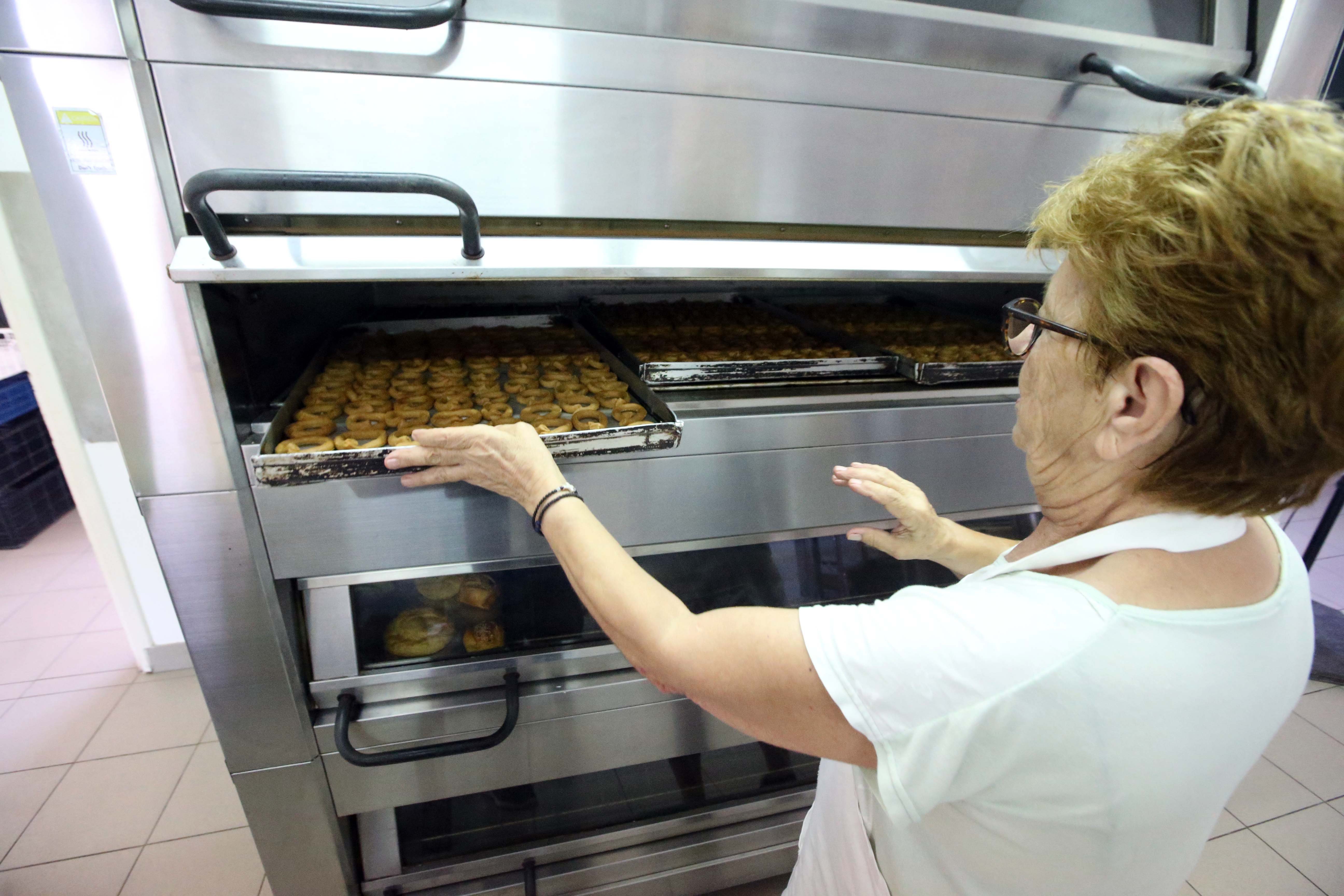
Elena is the daughter of Chrystalla and Andreas – and also used to work at the shop till 2023, though presumably not on the day when the German couple came by. She practically grew up in Faros, and refers to Michalakis Touridis (the original owner, who passed away in 2001) as ‘Grandpa’ – but was also the driving force behind the evolutionary leap in the bakery’s history, building this workshop in 2009 in the house she shares with her husband Nikos and their family.
Faros has a long history, longer than I’d realised. The shop I knew, on Thermopylon street near Ochi roundabout, has been there since 1948 – but the bakery goes back even further, in fact (I’m assured) it’s the oldest in town.
It was first renowned as a patisserie and cake shop – hence the downright dessert-ish tahinopita – and extremely popular. There were almost a dozen employees when Chrystalla joined in October 1974, sometimes working through the night to complete their orders. “I’d just got engaged,” she recalls with a smile. “And now we’re old people with grandchildren.” She was 22 at the time (she’s now 73, putting Elena somewhere in her 40s), but already a veteran. She’d been working since the age of 13, taking the bus from Kampia to Nicosia and various menial jobs, so young she’d be ordered to hide when the social-security inspectors came calling.
Her parents were poor, of course, but not destitute (her mother worked as a cleaner); so why no schooling? “We didn’t want to go,” she replies, meaning herself and her two sisters. “We didn’t want to go to high school. Later on you regret it, of course, but it’s too late…”
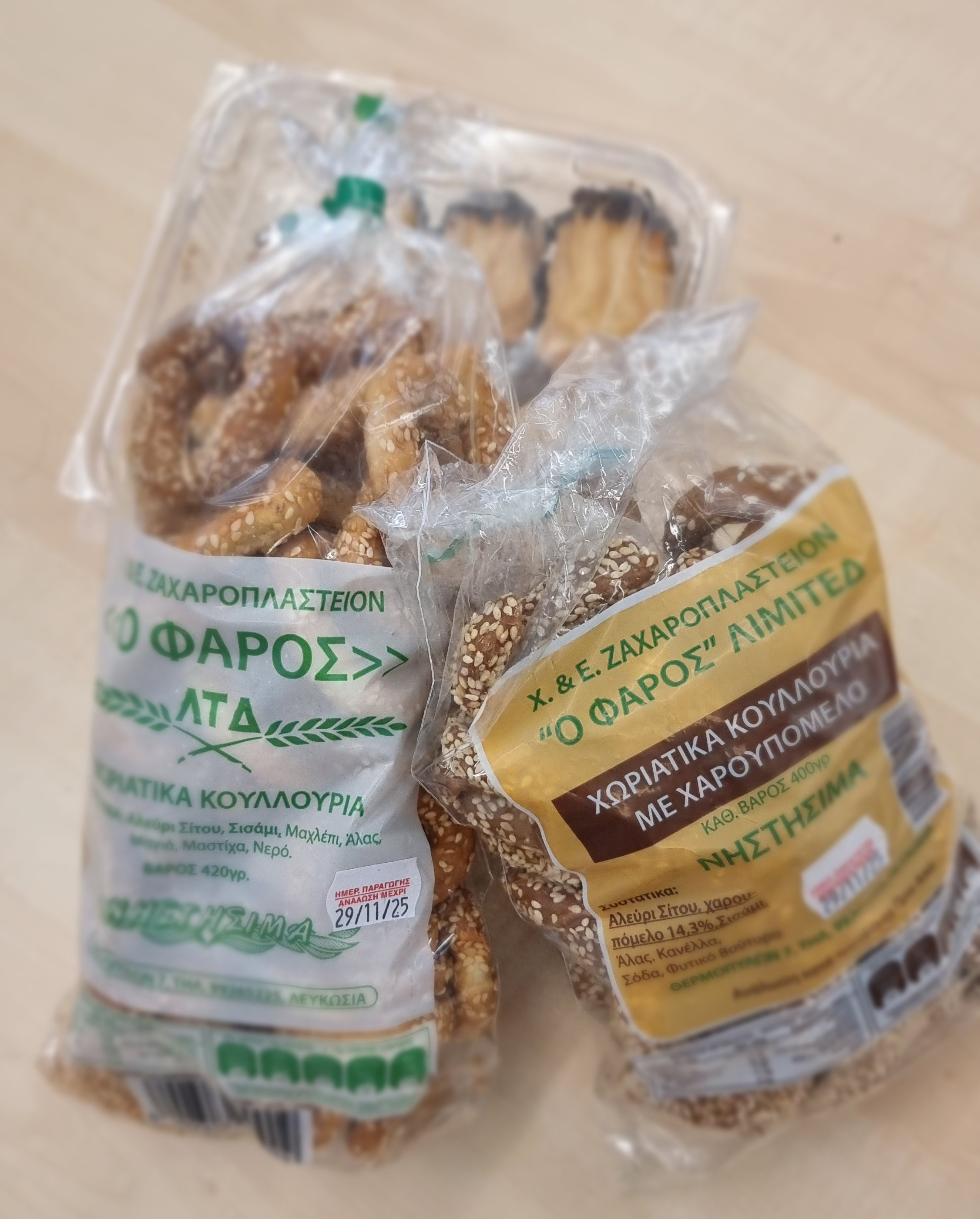
Instead she rose through the ranks at Faros – and, when Touridis got sick, he signed the shop over to her in 1998, though by then the staff was depleted, the good times were almost over, and the neighbourhood was already growing sleazy.
“It was a bad neighbourhood,” says Elena, who joined her mum at Faros in 2000. “It was full of bars. The old kind, if you know…” she tails off, meaning bars where prostitutes were for sale.
That’s why she built the workshop and moved to Kampia for four years working the wholesale side, till defeated by the economic crisis – though of course having the equipment came in handy a few months ago, when Chrystalla left the old Faros permanently after 51 years.
It’s easier in the village, of course. She used to set off at 1am every night, to drive down to Nicosia and start baking. Now she and Andreas leave the house (they live just down the road) around 4.30, working till midday – mostly petit-four biscuits and ‘koulouria’, the sesame-covered round breadsticks with a hole in the middle. All their old suppliers still call, bringing ingredients – flour, oil, sesame, carob syrup, mahleb and mastic. It’s like the old shop never closed; a happy surprise, indeed.
Why still do it, though? Hasn’t she had enough, after 51 years?
“I can’t stay home,” she replies. “I’d die!” She has to work, it’s all she’s ever done for 60 years. She was always a fiend for work, and cleanliness too – and recalls being inwardly annoyed when Touridis, a larger-than-life character, would invite people in for a coffee. “Just treat them to a cake instead!” she’d seethe, not wanting to pause in her work to make coffees.
They sit on a sofa in the workshop, mother and daughter – similarly driven, but different too. “She’s a quiet person,” says Elena when I ask her to describe her mum’s personality. “She doesn’t speak up. People walk all over her, in other words.”
“I don’t talk,” agrees Chrystalla.
“She doesn’t… That’s why everyone loves her so much. I’m more – explosive, let’s say!” she laughs.
Elena didn’t like the old neighbourhood, and had a fear of staying by herself in the old shop – but Chrystalla was amiable and quiet, and nothing ever spooked her. “Good morning, mama!” the African migrants would greet her, in the past few years when the area became something of a ghetto. The late-night bars offered security too, just because there were people around. Faros was only ever burgled once – by a druggie, who trashed the place but found nothing to rob – and that was recently, when the bars started closing down.
“I had no problem with the neighbours,” she shrugs. “Or what’s left of them. There was the jeweller opposite, there was Mr Dimitris the tailor. There was Solis the butcher – he’s shut down too – Andreas the barber, Andros at the liquor shop… He’s shut down too, just now. 15 days ago.”
Alas, Solis the butcher and Andros at the liquor shop don’t (presumably) have a Plan B in some handy village, with a workshop and a distribution system already in place. Faros sells its wares in nearby villages, plus some supermarkets in Nicosia (Chrystalla also goes into town on Friday mornings, to deliver to customers) – but the old town is definitely vanishing, a slow insidious process they’ve witnessed close-up. “Suddenly everything is closed,” muses Elena, “and you’re left on your own.”
The two women blame gentrification, and believe – like many of the area’s old residents – that municipal authorities have an agenda, the plan being to drive out traditional small businesses and replace them with student dorms and well-known brands, including bigger bakeries like Zorbas. It might even be a good idea, says Elena generously. It could add some life – but not for families, or older people.
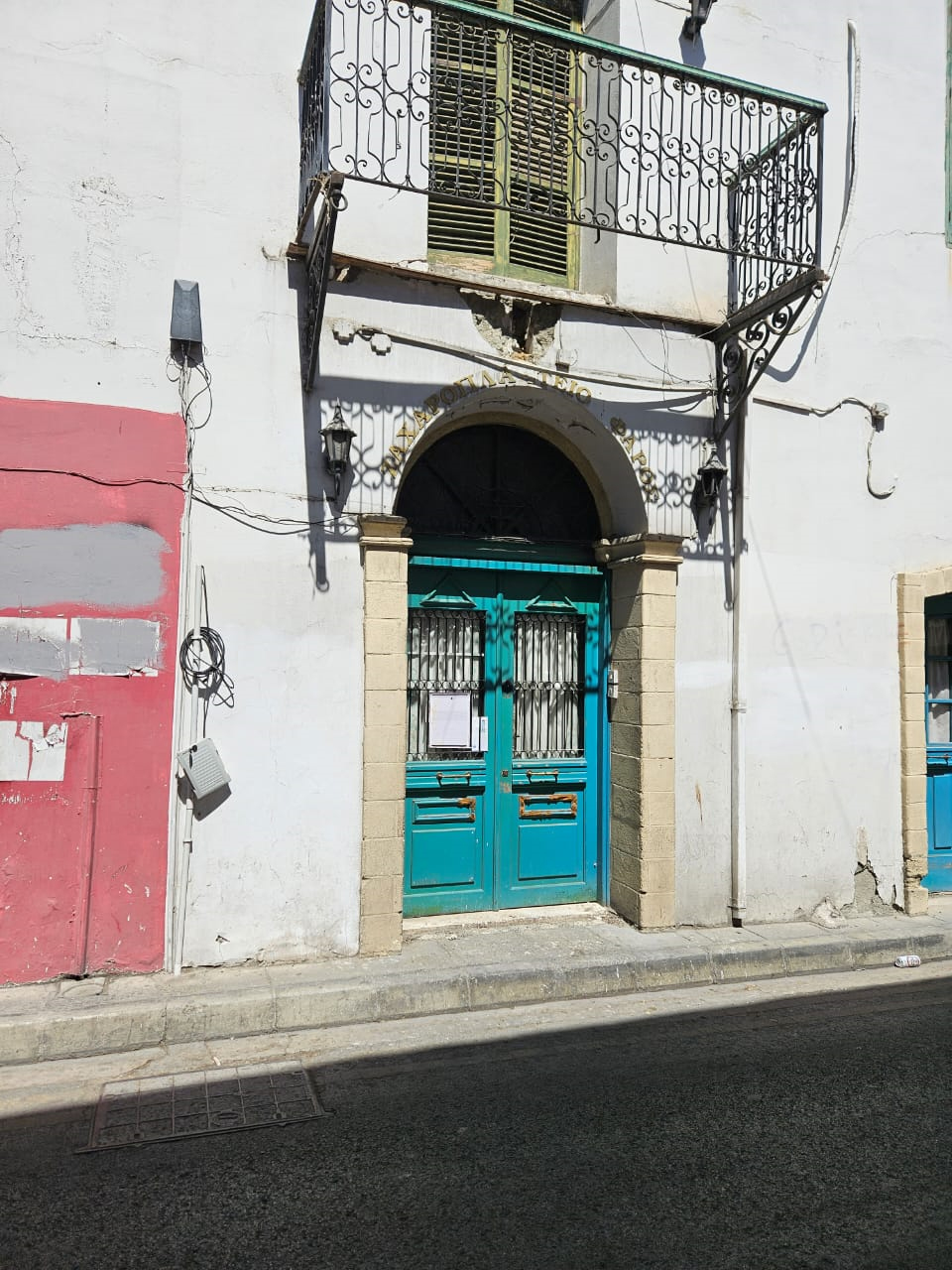
“I mean, I won’t go all the way down to old Nicosia with my family,” she says (she has two kids, a grown daughter and a 10-year-old son). “I’ll go to Larnaca or Limassol, not downtown. Downtown to do what? There’s nothing there!”
“It’s dead,” agrees her mum.
“Nothing.”
“If we were there, we’d be stepping on flies [i.e. we’d have nothing to do] now.”
They were planning to close the old Faros anyway – but their hand was forced when the roof collapsed, the building having slowly become uninhabitable. They left just after Easter, initially not even bothering to leave a note with their new location; the regulars – such as they are – already knew the situation.
Faros isn’t just a shop. It’s a brand, a legend, it’s 80 years of history. Elena and Chrystalla share some of the lore of the place. The Lebanese man – a good friend of Grandpa’s – who gave them the recipe for Faros biscuits just two hours before he was due to fly back to Beirut, and somehow managed to give the wrong recipe. (They figured it out by trial and error; the man himself vanished, and they heard he’d been killed soon after.) The brawls they used to overhear while baking, coming from the nearby bars in the wee hours. The bite-sized cookies with wine and carob syrup – possibly Chrystalla’s proudest recipe – which were just too expensive, and sadly had to be discontinued.
All that and more, to be sure – but Faros is (or was) a shop too, and it hurts that the shop is no more.
That bright-turquoise door meant something, like every part of the physical environment which the authorities (in their wisdom) keep trying to change unrecognisably. I knew who was there and what they did, even when I didn’t go in. Now it means something else, or perhaps it means nothing – a memory that’ll dwindle with time, like the other memories around it, and eventually fade altogether.
It’s true, agrees Elena, it is painful. “It’s like someone died. And they disappear from your life, just like the shop did.” Seeing Faros up and running in Kampia was a happy surprise – almost a miracle, like seeing the dead resurrected. Still, it’s not the same.
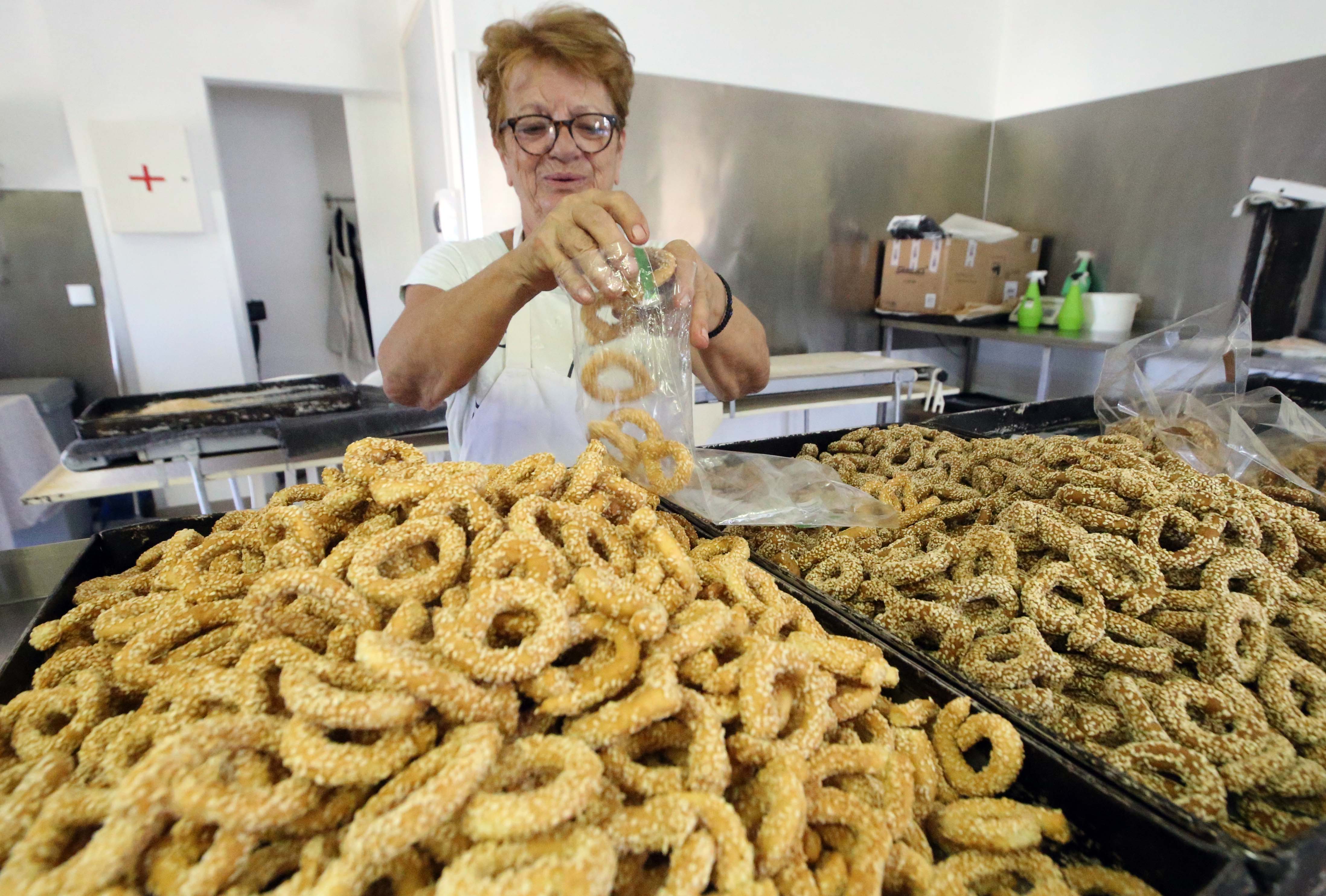





Click here to change your cookie preferences